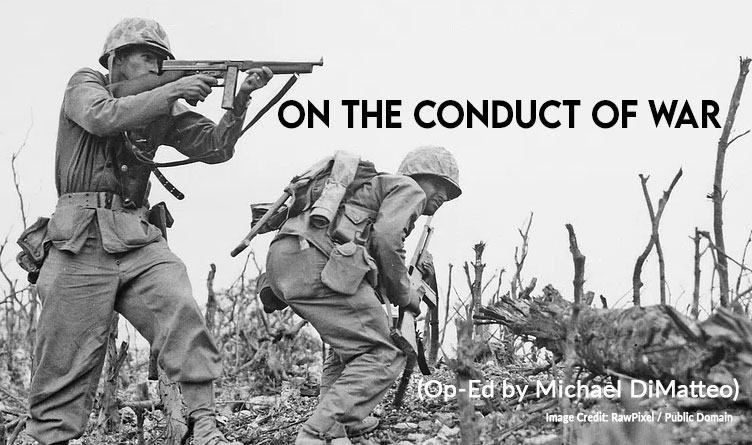Image Credit: RawPixel / Public Domain
Submitted by Michael DiMatteo –
General George Patton once said, “There is only one tactical principle which is not subject to change. It is to use the means at hand to inflict the maximum amount of wound, death, and destruction on the enemy in the minimum amount of time.”
To the modern mind, those sentiments are anathema. The notion of complete annihilation during war does not compute today, especially since the end of World War II, maybe the last war to be conducted with that mindset. Moreover, anyone today who espouses such thinking is seen as a war criminal, a man out of touch, a creatin, circumstances notwithstanding.
We, in our post-modern way of thinking reject, out of hand, such thoughts as they pertain to war or just about anything else, save, it seems, protestations against perceptions of inequality, where violence seems acceptable, excused, and even encouraged as “for the common good,” or “because change is often ushered in through violence.”
I reject the above sentiments out of hand but stand with General Patton when it comes to the conduct of war, barbarian that I am. It seems since World War II, the United States and Western Europe have forgotten what actual war entails. The West has forgotten that destruction, death, and annihilation are needed to bring an enemy to heel. We’ve forgotten that war is an ugly business, and that ugliness is precisely why it needs be avoided, if possible.

But there is a stark difference between avoidance and appeasement, the latter of which does little other than embolden the one being appeased. This is true in almost every field of endeavor. The lessons taught by appeasement seem never to be learned, no matter the time or circumstance, Munich notwithstanding.
Europe, and in a more limited fashion, the United States fought two devastating world wars, both characterized by a phenomenon called total war, meaning all a nation’s resources are dedicated to prosecuting said war; this included industry, the economy, and the nation’s most precious resource, its population, the significant majority of them being its men.
To be sure, nefarious forces also were at play: Industrialists who made a fortune making the materials for war, as well as leaders and influencers who found it profitable to foster the war’s prosecution, but when has this not been the case. Tribal leaders of Africa, Mesopotamian leaders in the ancient past, as well as any other society one can imagine have done the same thing. Have we completely forgotten the Aztecs, that very society venerated today being some of the most ruthless conquerors in world history? Taking prisoners and keeping them for later human sacrifice?1
The difference is the West fought those wars in the modern age, where film exists, writers documented it all, and veterans returned broken, battered, and many in pine boxes for all to see. It is not a pretty sight, turning the stomach for most, and grieving with the families who lost their brothers and sisters to such nonsense.
Images of entire cities bombed out of existence, the untold numbers of innocents lying under the rubble is enough to make any rational person reject out of hand, modern warfare and its implications and realities. All one need do is revisit documentaries of the Second World War and be overwhelmed with images of the devastation, corpses lying in the street along with mutilated children and their parents. Innocent victims all, no matter which side they were on.
One British citizen during the Blitz2 was asked if they should return the same on the Germans. The answer, as one might expect, was a resounding “yes”, the response being, “What are we to do, not return what they’ve given to us?”3
Does any reader truly believe that if Hitler had sued for peace, it should have been a viable option for the Allies to consider knowing the atrocities committed during that regime?
There were attempts to disarm entire nations, to make war unpalatable in the West, mostly the result of the Great War’s devastation. Disarmament was part and parcel for European nations and the United States after that event4 and might have been the same after the Second World War save the threat, real or imagined, of Soviet expansion. It was only the advent and use of the A-bomb by the United States that kept the peace for a time, says one argument. It was also during that time the West detached itself from the notion of total war, preferring isolated conflicts, or as writer Norman Podhoretz wrote in his book Why We Were In Vietnam fighting war on the military and political cheap.
The idea was to expend as little energy as possible, be it in men or equipment, to fight these conflicts, preferring a “limited” engagement rather than full-blown war. My uncle, who served as a forward observer during the Korean War5 was given instructions not to fire upon the enemy unless there were 25 of them.

Think on that for a moment. I asked him what he did, and his response was, “We lied. We were not going to just sit there until they had more to overrun us.”
Another book, This Kind of War by T.R. Fehrenbach gives a detailed account of the American effort in the Korean war and recounts the same difficulty in prosecuting that conflict. Political considerations were paramount, more so than prosecuting the war to a proper conclusion. Yes, I deliberately used the word proper. Rather than fight to the death, wars are now fought to the pain, just enough to inflict damage to teach a lesson rather than cut the cancer.
The general public, especially in the West abhors war, and rightfully so. But that abhorrence prevents nations, Western nations, from prosecuting a war properly, and that means to the death, not the pain.
There is also the notion of ROE…rules of engagement.6 Rules that determine how the average soldier, the ones putting themselves on the line, are to defend themselves. Those ROE have become more and more restrictive over the decades since World War II, attempting to ensure, despite the peril presented, women and children, the innocents, are preserved and do not fall victim to the conflict.
What would the world be today if the allies during the Second World War adopted that posture? Is it conceivable Hitler and Stalin would have abided by such rules? If you believe they would have, you’ve certainly not studied history or the history of these men and their nations.
This is the conundrum of conducting a war, and one of the reasons wars today rarely produce a lasting peace, or at least a peace of consequence. They are not fought to the death, but to the pain.
I am not unaware of how this sounds, coming from someone who never fought in a war, much less spent time in the military. Further, I am not insensitive to the sacrifices made by military families, the greatest of which is the sacrifice of life. Truly, we are in their debt.
However, I am a student of history and not a casual one. I am quite aware of what constitutes war, what creates war, and what brings them to an end. History is my guide. Not just the modern version but the totality of it, as much as my mind can grasp.
War, total war, is never wanted and should be avoided at all costs. Of this, war should be avoided especially in the modern day when weapons of war are more lethal than at any other time in history. Armies no longer fight each other on a designated battlefield as they once did in our distant past. The blood spatters on our very window, happens right outside our door, or comes in, revealing itself in all its horror, taking the innocents as well as the combatants.
We’ve attempted to remove brutality from the conduct of war, and the results are staggeringly impotent; that strategy does not work. Those who revel in conflict, who would elevate themselves through threats of violence, are able to do so without fear of significant reprisal as the stomach for the horrors of war are not palatable to the civilized, post-World War II Western mind.
Those nefarious forces play on that weakness, the unwillingness of a society to defend itself to the fullest, knowing their aggression will win the day, the mantra “death by a thousand cuts” their rallying cry.
Listen to the words of Sun Tsu from The Art of War: “But a kingdom that has once been destroyed can never come again into being; nor can the dead ever be brought back to life.”
This is not a call for war, nor is it a glorification of that endeavor. It is simply an explanation that should war be thrust upon a people; it must be prosecuted to the end, the ugly end, in the fervent hope that such a conflict never be fought again.
Yes, innocents die. Precisely the reason responsible governments should weigh carefully the costs of war, avoiding it if possible.
The Second World War changed the nature of war in the West, but also changed the attitude toward war for the West. It has permeated our culture to the point the old virtues of strength, courage, and a willingness to defend ourselves have almost been eliminated from the male culture of Western society. No society which has lost man’s innate strength and willingness to defend itself has survived over time.
Rather, they have become victims.
___________________________________________________________
1 These were referred to as “flower wars” in which the Aztecs would capture neighboring warriors only to sacrifice them later as tribute to their gods in times of famine.
2 The “Blitz” was the period during the Battle of Britain (1940) wherein the German government was bombing in daylight and eventually at night, the entire population of London, attempting to terrorize them out of the war.
3 The World at War, episode 15.
4 The First World War is often referred to as The Great War.
5 America’s “forgotten war”. He was a member of the 1st Marine division, 7th Regiment, 1st Battalion. 4.2 mortar company.
6 From Wikileaks – ROE during the Iraq War: War by the rules in Iraq – WikiLeaks


About the Author: Michael DiMatteo is a retired history/political science teacher living in East Tennessee. He was also a Golden Apple Teacher of Distinction in 2010 in the state of Illinois as well as a member of the Illinois High School Football Coaches Association Hall of Fame. He is currently an author and writer with three published books and writes a twice weekly Substack. He can be found at: mikedimatteo.substack.com




One Response
Great article brother. You hit the nail on the head with this one.
America is an exceptional country with a proud and illustrious past. We have to study war to learn how to prevent it. No country ever accomplished anything worthwhile, negotiating. We are giving money to Iran, and left billions of dollars in weapons in Afghanistan, thanks to Biden’s incompetence. Now the Iranians are taking our weapons and money and supporting Hamas to kill innocent Jewish people in their own country. There was a time when the world respected us. “An Army of lions led by a sheep is not as feared as an Army of sheep lead by a lion.”